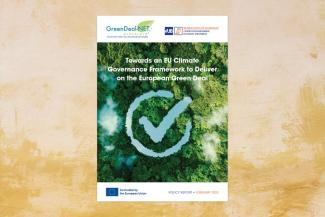
Oberthür, S., Moore, B., von Homeyer, I., Söebech, Ó., Boasson, E. L., Dupont, C., ... & Torney, D. (2023). Towards an EU climate governance framework to deliver on the European Green Deal: policy options paper. GreenDeal-NET.VUB. Brussels.
Related Research: Towards an EU Climate Governance Framework to Deliver on the European Green Deal
VUB authored a policy options paper shedding light on the EU Climate Governance Framework. This paper is not part of the 4i-TRACTION project but is related to the topics of our research.
The EU and its member states face the challenge of accelerating the transition to climate neutrality and negative greenhouse gas (GHG) emissions in increasingly turbulent times. But the challenge of governing the climate and energy transition goes far beyond phasing out GHG emissions. Given the urgency, dynamism, complexity, contentiousness, and long-term, crosscutting nature of the “super wicked” climate challenge, the governance of the climate transition requires sustained, comprehensive, and integrated efforts across all relevant policy fields and the whole of society. To this end, the EU needs to devise political processes, structures and institutions that empower democratic political systems in Europe to effectively respond to the climate challenge (hereinafter referred to as the EU’s “climate governance framework”).
In this paper, key options for enhancing the EU’s evolving climate governance framework to this end are identified. Building on the latest scientific knowledge of relevant best practice in Europe and elsewhere, as for example reflected and acknowledged in the Intergovernmental Panel on Climate Change’s Sixth Assessment Report (IPCC, 2022b), the EU’s existing climate governance framework and identify EU-level policy options for further enhancing it across the Union and its member states is reviewed, while paying particular attention to key interactions, synergies and tensions between individual governance elements.
The analysis identifies options in the following nine key areas:
- National Energy and Climate Plans (NECPs), created under the EU’s 2018 Governance Regulation: improve the NECPs by reinforcing public consultation requirements, strengthening the integration of the energy-security dimension, augmenting review and support, and enhancing requirements for consistency between NECPs and Long-Term Strategies.
- Long-Term Strategies (LTSs) under the Governance Regulation: strengthen national LTSs by enhancing public consultation and input, aligning NECP and LTS processes (timing and content), improving LTS quality and including emerging issues (such as carbon dioxide removal); regularly update the EU LTS alongside national LTSs to reflect dynamically evolving circumstances at the Union level.
- Climate-neutrality targets: to ensure a long-term policy perspective, require member states (in the Governance Regulation) to establish economy-wide climate-neutrality targets in line with the EU’s 2050 target, or even to achieve economy-wide climate neutrality by 2050 at the latest; this may usefully be part of and guide national LTSs.
- Consistency and climate policy integration across different policy portfolios: focus consistency assessments mandated under the European Climate Law on key cross-sectoral policies (including potential for creating synergy between policies), further codify the “Do No Significant Harm” principle, enhance integration of climate objectives in the European Semester process and EU (climate) spending, and strengthen climate expertise in relevant EU advisory committees.
- Independent scientific expert advisory bodies: support the establishment of appropriately designed national bodies in all member states, including by strengthening related requirements in the European Climate Law; specify the link between EU policy making and the European Scientific Advisory Board on Climate Changeestablished under the European Climate Law (e.g., requiring input to the EU LTSs and regular progress reviews) and ensure allocation of sufficient resources.
- Review of progress and implementation (transparency): strengthen reporting requirements for member states and review arrangements, including enhanced reporting on the just transition, investment frameworks and sectors beyond energy and transport; and issue targeted recommendations to member states.
- Effective implementation (including enforcement): improve review and response mechanisms under the Governance Regulation (regarding NECPs, LTSs, renewable energy and energy efficiency targets), in particular by strengthening cross-compliance arrangements with EU funding streams, and by fully mobilising existing implementation mechanisms (infringements, technical assistance).
- Access to justice in climate matters: require EU member states to provide for such access on climate and energy issues, either in the Governance Regulation or in individual pieces of relevant EU climate legislation.
- Public participation: strengthen participation at the EU and member-state levels, including through the establishment of more specific participation requirements in the Governance Regulation (related to NECPs, LTSs, and other climate policy), the targeted use of new forms of deliberative democracy (climate assemblies, mini-publics, etc.) in the context of the European Climate Pact, and a further upgrading of consultation structures on EU climate policy.
This options paper does not aim to conclude the debate but rather to advance a continuing discussion on, and stimulate thinking about, the further development of identified options and their combination into coherent sets or packages. The upcoming reviews of the Governance Regulation and the European Climate Law, along with accompanying processes, provide a unique opportunity to make EU climate governance fully fit for supporting the climate and energy transition – an opportunity that, given the urgency of the climate challenge, must be fully exploited.